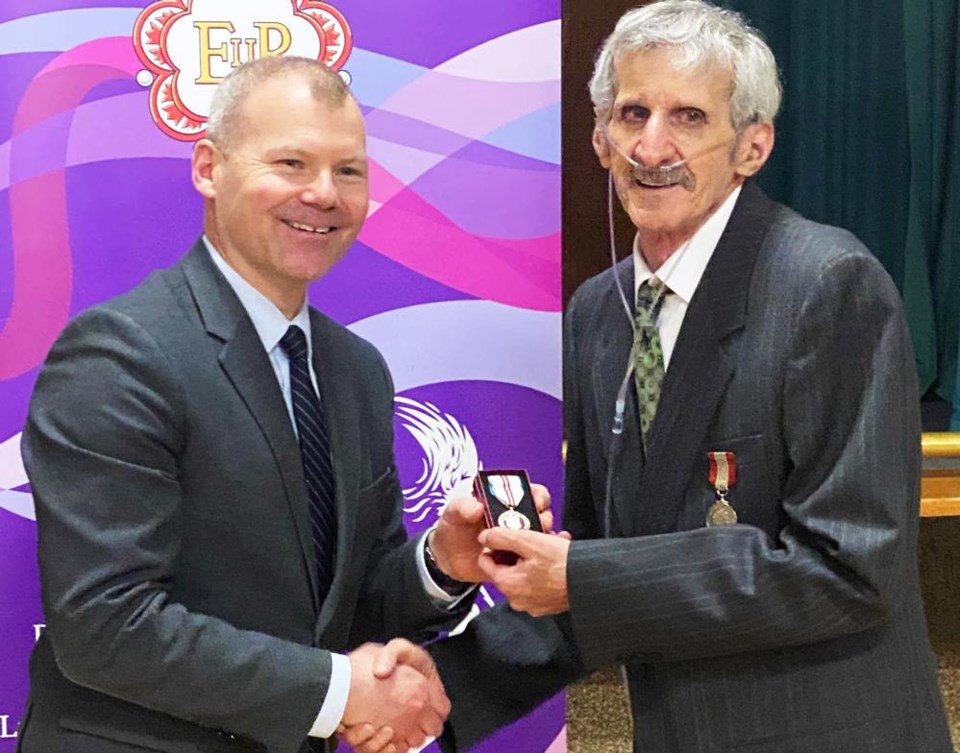WEYBURN – Weyburn’s Community Low Income Centre is a busy place, says its lone volunteer and founder, Fred Sandeski, as he helps between 350 and 400 people a year in various capacities.
“We provide a lot of services other people aren’t able to provide, or aren’t willing to provide. We try to find the holes in our society, and help the people falling into these gaps. These are the people we try to deal with,” said Sandeski, in a presentation he gave to the Weyburn Rotary Club on Thursday at their luncheon meeting.
The centre, based at the Canadian Mental Health Association building on Ashford Street, provides a number of free services for those who need help.
Sandeski explained the purpose of each of the services, including an advocate with Social Services and Housing.
“We advocate for people’s rights with the government agencies they’re involved in,” he said. The service provides assistance including answering questions on policies of the agencies, mediating disputes and aiding through the appeal process.
A free legal clinic is also provided with the services of Pro Bono Legal Services in Regina. They contact a lawyer through Skype and the lawyer provides a client with free legal advice.
“You can make appointments with us, and we’ll set you up with a lawyer who can represent you the best,” said Sandeski, adding the lawyer won’t appear in court for you, but will provide advice on how to handle an issue when they come up in court.
A free community volunteer income tax program is also available, said Sandeski, with the centre dealing with close to 200 people every year, helping them do their income taxes.
“One service I’m particularly proud of is the trustee program. We have a number of people we allocate money for, and we provide them a solid basis foundation to work from so they can get their bills paid and save money. That’s one of the goals we have is that they can set up a savings account and put money into it each month as far as they can afford,” he explained, noting the clients are often surprised at how fast the savings add up.
“One of the first women I was dealing with actually cried when we set up a savings account, because had never had one,” said Sandeski, noting they help clients to set goals for themselves for the savings, and help them to reach those goals.
Part of this program is also budget counselling, as under the trustee program, there are two signatures on the accounts, his and the client’s. They sit down with Sandeski and discuss what needs to be paid, and what things the client wishes to spend money on.
“A lot of times when you’re dealing with Social Services, their benefits will be suspended for an amount of time (if bills aren’t paid), and when they don’t get a benefits cheque, it’s hard. They’re always about getting the rent paid, getting the gas paid and getting the electricity on. That’s all covered with the trustee program,” he said.
Sometimes a client gets to the place where they feel comfortable handling their own money and end the trustee agreement, but then a few months later when they run into problems, they come back to him and admit they haven’t been able to keep up the budgeting properly.
Asked if he finds the clients’ self-esteem is improved through working in this program, Sandeski replied, “Without a doubt. I’ve had people close out the account and leave with $9-10,000 in their pockets.”
One gentleman he dealt with came to him as he owed the government $4,000 after driving an uninsured vehicle and getting into an accident. He was on social assistance, and had no idea how he would ever be able to pay this money back to the government.
Noting the person passed away a little while ago, Sandeski said the bill was paid back, and at the time he died, there was $5,000 in his bank account, so he was able to help him through this situation.
As an example of counselling he’s done, he told of one man who asked to forego the rent until his GST rebate came in so he could buy a gaming console.
“I said, that doesn’t work. Let’s wait for the GST to come in and then look for a gaming console,” said Sandeski.
Asked how many people the centre deals with, Sandeski noted on average, he’s dealing with 350 to 400 people, with a number of those being phone calls. He has had people call from Prince Albert and Yorkton, as well as from B.C. and Ontario, because his is one of the few advocate services available in Canada, as well as one of the few free legal clinics available.
The centre gets no government funding, he noted, but mainly operates on donations from individuals and groups, and said the community has been very good to him in providing funds that enable him to offer these services. They are one of the agencies funded by Communithon, plus they get free rent from the CMHA to use their facility as the headquarters.


